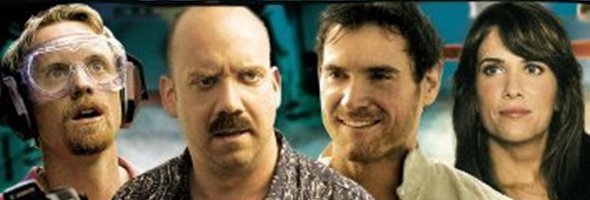If you were to try to sell me on an indie comedy about a fast-talking entrepreneur who hires a cranky engineer to build a rocket belt so they can all become millionaires, I would immediately dismiss the entire affair as painfully quirky and probably a disaster. If the entrepreneur is played by Billy Crudup and the cranky engineer is played by Paul Giamatti, however...well, I'd obviously at least give it a shot, since I'm writing the review. Thankfully the film never tries too hard to be more than it is: a solid little character piece with two excellent actors doing what they do and doing it well. Curtis Prentiss is a man with a plan. It's not a very good plan, but it is by God a plan. Curtis doesn't ask for much out of life, just his little slice of the American dream. And in his mind, that slice has a rocket belt strapped to it, propelling it through the clouds with carefree abandon. He has the plan, he has the dream, he has the drive...but he doesn't have the money to actually build a rocket belt, or indeed any idea how to go about doing so even if he did. For the former problem, he tracks down his old friend Kenny (David Hornsby), a mild-mannered mattress-store owner who Curtis talks into becoming the sole investor in his hair-brained scheme. For the latter problem, he hires Rick Honeycutt, a disgruntled, out-of-work engineer who doesn't trust Curtis but is lured in by the prospect of finally getting the credit for something he builds himself. Using old blueprints for an earlier abandoned attempt at rocket beltery, Rick starts tinkering and Curtis starts looking for other investors. As the weeks stretch on and Kenny's money dwindles, the trio's hopes of getting rich quick are lost in a tangle of distrust, suspicion, and betrayal. Can't well just get along? And, you know, make rocket belts?
There's not much to Pretty Bird on the story front. The motley crew assembles with lofty goals, then swiftly turn on each other when all the reasons no one has ever mass-produced rocket belts begin to become all too clear to them. Of course, most of us could come up with several of these reasons even without having researched actual historical attempts to build personal flying devices, and the fact that none of these obstacles occur to Curtis, Rick, or Kenny is part of Pretty Bird's charm. With the exception of the actual finale, it's not too difficult to predict where the story is headed. Hell, we only actually see a rocket belt flying once or twice. So what does Pretty Bird have going for it, exactly? It's got a two funny, tragic, well-written characters at its heart, with two of the very best character actors of our day bringing them to life.
Curtis is a dreamer, but the sort of dreamer whose enthusiasm has begun to crack after too many years of disappointment and too many dreams that didn't pan out. He ignores those cracks by pushing harder, moving faster, planning bigger, and never, ever slowing down. He keeps a brave face on in spite of every rejection. He gives self-help books as gifts without a hint of irony. In many ways, he conjures up memories of Jack Lemmon's desperate Shelley Levene from Glengarry Glen Ross. Shelley is Curtis a few decades down the line, when the cracks are too big to ignore, when the whole damn thing is threatening to crumble at any moment. Crudup shines by playing all the levels of Curtis, both those he's conscious of and those he refuses to acknowledge, and he gets some meaty moments later in the film when his fragility begins to show during a confession about his father and a heated blow-up at Rick.
For most of his career, Giamatti has been playing ill-tempered outsiders, with the scale sliding from loveable schlubs to angry misfits who will NOT be drinking any fucking Merlot. In Rick Honeycutt, Giamatti buries the needle on the angry-misfit end of the spectrum. On the surface, that might not offer much of interest -- what do you know, Giamatti's pissed off and yelling again -- but it's in his embrace of Rick as a thoroughly unsympathetic and borderline sociopathic character that he makes what seems like an easy choice far more entertaining. We go in expecting the usual and waiting for the unlikeable Rick to fumble toward redemption...and instead he just slowly loses his goddamn mind.
Both history and storytelling are full of stories like this, tales of an idea that might just change the world, and the ways it either did or didn't, and why. As is so often the case, the idea in question here is almost beside the point. Hell, the idea is patently ridiculous. Anybody with any sense would know right off that this entire enterprise is destined for failure. For crying out loud, it's not even an original idea; they're using blueprints from an earlier failed experiment, and it's not like they have any bright ideas about how to circumvent the problems that derailed that incarnation. But none of that matters, because any self-awareness they might have is boarded up behind years of failure and frustration. They don't want to build a rocket belt just to build a rocket belt. They want to build a rocket belt so they can have something to show for their miserable lives for once.
Pretty Bird probably won't land on any year's best lists, but if you're in the mood for a dark little tragedy about flawed characters enthusiastically failing to rise above those flaws, it's worth 98 minutes of your time. There's a certain perverse entertainment in watching as the dreams of rocket-powered personal flight are trampled beneath all the elephants in the room. If only because it distracts us for a while from just how many unrealized dreams we've got lurking in our own closets... I always forget how muddy DVD quality appears when you're used to high-def, so it's hard to gauge how much of Pretty Bird's look is a result of budget or intent, rather than outdated technology. Suffice to say, it's not the greatest looking movie you'll ever drop into your player, but then again it's not really supposed to be.
As for special features, nary a one. The flick was clearly shot on a budget, though, so it's hard to hold that against them. Although the least they could have done was include a "How to Build Your Own Rocket Belt" documentary.
Your Daily Blend of Entertainment News

